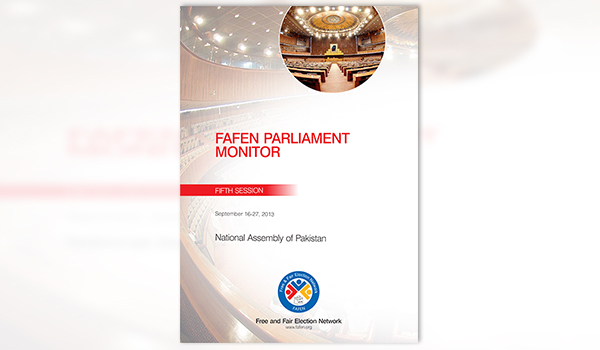
The National Assembly’s fifth session responded to the unfortunate and tragic incidents of terrorism, molestation of minors, and natural catastrophe in September 2013 by debating them and adopting resolutions.
The House adopted supplementary resolutions jointly brought in by members of various parties to condemn the suicide attack on the church in Peshawar, incidents of rape of minor girls, killings of army men in Upper Dir, and expressed sympathies along with calls for rehabilitation of the earthquake survivors in Balochistan.
Four government and five private members bills were introduced during the session as the House left more than 60% of the private members’ agenda unaddressed.
One of the government bills introduced during the session called for removing age restriction for deceased government employees for their families to be eligible for a monthly benevolent grant. The three other bills sought the establishment of Islamabad Bar Council, appointment of the Chief Justice of the Islamabad High Court as a member of the National Judicial (Policy Making) Committee (NJPMC), and the repeal the redundant Federal Court Act 1937.
The five private member bills sought the establishment of local governments in Islamabad Capital Territory; safety from and control of HIV/AIDS; error-free publication of the Quran and proper disposal of its martyred/damaged pages and copies; women’s meaningful representation in political process within the political parties, parliament, provincial assemblies and the local government; and eliminate the use of copy of Computerized National Identity Card (CNIC).
Additionally, aiming to regulate and implement surveying and mapping standards, the Surveying and Mapping Ordinance 2013 was laid before the House.
Spread over ten sittings, the session from September 16-27, 2013 met for 38 hours and 11 minutes, with each sitting on average lasting three hours and 49 minutes. Eight breaks were observed in the entire session consuming 10% of the session’s time.
The Prime Minister did not attend a single sitting of the session while the Leader of the Opposition attended five sittings for a total of eight hours and 13 minutes. The Speaker chaired the proceedings for 22 hours and 25 minutes or 59% and the Deputy Speaker two hours and 51 minutes or 7% of the session time. The remaining session was chaired by the members of the Panel of Chairpersons for eight hours and 58 minutes or 24% of the session time.
The House left a little more than 50% (45 items) of the total 86 agenda items on the orders of the day unaddressed. Around half of the agenda appeared on eight government business days and the other half on two private members’ days. As the agenda of the private member’s days has too many items to be addressed in two sittings, more than 60% of it was not taken up. The agenda of the sixth, seventh and eighth sittings was suspended to debate the suicide blasts on the church in Peshawar and the earthquake in Balochistan.
The Lower House does not share the members’ attendance record with the public. To this end, the FAFEN observer conducts a head count of MNAs in the beginning, the adjournment and at the time of maximum attendance in the House. Members’ attendance was observed low during the session with 55 MNAs (16 %), on average, present at the start, 61 (18%) at the adjournment and 145 maximum members (43%) at a time during a sitting.
A little less than half of the members – 47% – participated in the session. Overall, members demonstrated more interest in both submitting as well as debating agenda. A total of 70 MNAs (21%) submitted agenda and took part in debates, 61 (18%) submitted agenda while 30 (9%) legislators only took part in debates.
Out of 552 questions on the agenda, 381 were taken up and answered. Additionally, 135 supplementary questions were raised.
Nine calling attention notices were taken up during the session. Three of the notices were related to delay in hydropower projects, absence of grid stations and power outages. The other were on the financial irregularities in Earthquake Reconstruction and Rehabilitation Authority (ERRA), arrest of a drunk pilot in UK and privatization of PIA, increase in prices of petroleum products, proposal of twin Islamabad City project and sale of Afghan registered SIMs in Khyber Pakhtunkhwa.
Three of the 11 motions under rule 259 submitted by legislators of PML-N, PTI and PPPP were debated in the House. A motion about the loan agreement with International Monterey Fund (IMF) was discussed for two hours and 30 minutes. Thirty-three legislators debated the attack on church in Peshawar for five hours and three minutes.
Lawmakers spoke on 116 points of order taking up three hours and 37 minutes (9% of the session time).
However during the session the National Assembly made use of the time reserved for the legislators to speak on issues which are not points of order under rule 18 of its rules of procedure. The purpose was to provide for lawmakers the opportunity to highlight issues other than points of order in line with the assembly’s rules. The rule 18 was part of the agenda during all but three sittings – the first, fifth and the tenth.
The session witnessed two walkouts consuming an hour and 50 minutes or 4% of the proceedings.
For complete report click here








